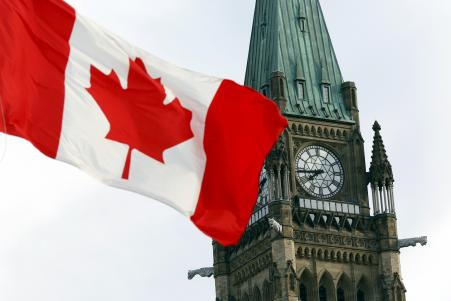By Elizabeth Whitman -

Canada’s economy shrank at an annualized pace of 0.9 percent in the second quarter of this year, Bloomberg reported Tuesday. Because Canada's gross domestic product, or GDP, fell at a rate of 0.6 percent in the first quarter, the ongoing slowdown would mark a technical recession for Canada, its first in four years. A technical recession is defined as two consecutive quarters of contraction.
Other sources reported the predicted contraction as being slightly greater than 0.9 percent. Statistics Canada was expected to report that the country’s economy contracted at an annualized rate of 1 percent in the second quarter, the Canadian Press reported. But the possible recession was framed as a brief one, despite falling energy prices.
"A number of positive elements are coming through," Beata Caranci, chief economist at TD Bank, said, the Canadian Press reported. "Even if, like we're expecting, we get a contraction in the second quarter, the consumption numbers are likely to be fairly healthy."
Canada’s vast array of natural resources constitute nearly 20 percent of the country’s gross domestic product and are linked directly or indirectly to 1.8 million jobs, according to the government site Natural Resources Canada. Canada is one of the top five natural gas and crude oil-producing countries in the world. It also produces potash, uranium, aluminum and other valuable metals and minerals.
As a result, the recent drop in energy prices has taken a toll on Canada. Most recently, after a major decline in Chinese stock markets Aug. 24 sparked worldwide concerns about economic turmoil, oil prices fell to a six-year low last week, though they have since begun to rise again. China is the world’s second-largest consumer of oil, and its reduced demand could spell troubles for oil-producing countries, especially as the 12 countries in the Organization of the Petroleum Exporting Countries, the cartel frequently known as OPEC, have so far refused to decrease production despite falling prices.
For Canada, some predictions for the third quarter forecast economic growth, ranging from 2 to 2.5 percent, according to TD bank, or 1.5 percent, according to the Bank of Canada. Others are less optimistic.
"Most of the forward-looking indicators are pointing to further weakness,” David Madani, an economist at the London-based consulting group Capital Economics, told the Canadian Press. “We are expecting a return to positive growth, but I think it's going to be growth that's fairly weak — well below the economy's potential growth rate of two percent."
